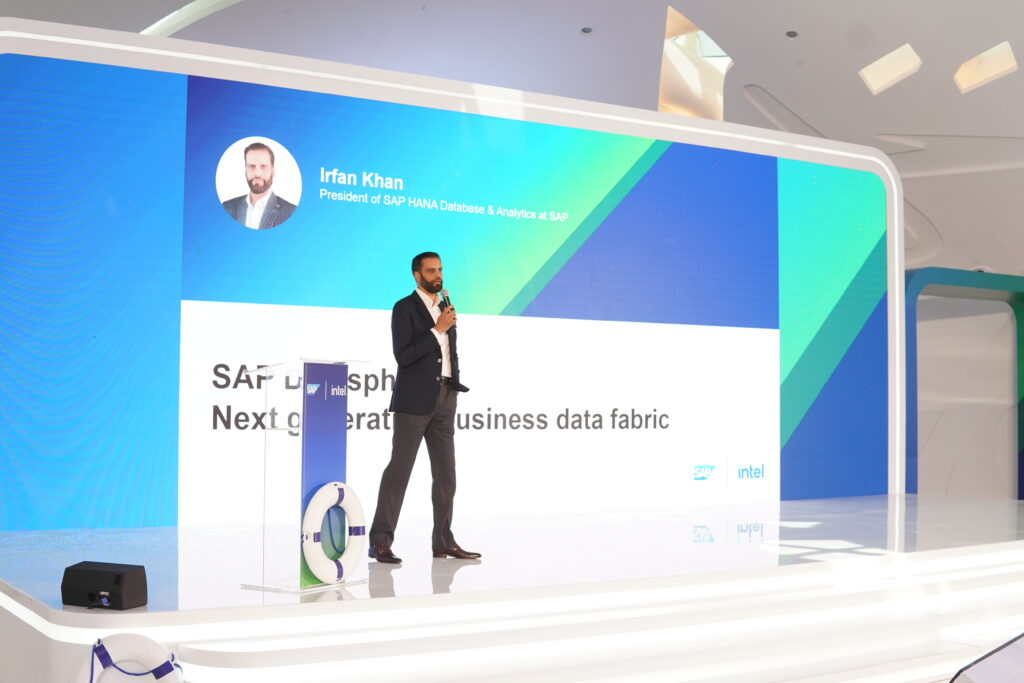As IDC predicts 20% YOY growth in Gulf countries’ AI adoption from 2021-2026, experts and customers share strategies at SAP Business Transformation Tour in Dubai
DUBAI, UAE — 14 June, 2023 – To thrive in the face of challenges such as supply chain constraints, critical skills shortages, and slowing global economic growth, regional businesses will need to adopt cloud platforms that enable them to leverage AI, data and automation solutions, according to experts speaking yesterday at the Dubai SAP Business Transformation Tour organized by global technology company SAP SE (NYSE: SAP) in partnership with Intel.
Held at the Museum of the Future under the theme ‘Navigating the Winds of Change in a Digital-First World’, the event demonstrated how embedding automation, data and AI capabilities into technology brings increased resilience, proactive as opposed to reactive strategic decision-making, and a more cohesive workforce, as well as better customer service thanks to Natural Language Processing.

Contextualizing current and predicted IT trends in the region, guest speaker Harish Dunakhe, Senior Research Director (Software & Cloud) at International Data Corporation (IDC), said “The confluence of AI, data, and automation – with cloud being its foundational platform – is driving current digital Initiatives in the market. In fact, automation and analytics solutions are seeing an accelerated adoption on cloud-based deployments as against on-premises.”
According to Dunakhe, AI adoption is expected to grow by more than 20% year on year between 2021 and 2026 in the UAE, Saudi Arabia and other countries in the Gulf. Furthermore, IDC’s research reveals that Big Data and analytics will grow by more than 20% between 2021 and 2026 on public cloud deployments. Dunakhe highlighted that these technologies can contribute to creating digital innovation initiatives that help business leaders build resilient organizations able to withstand the headwinds of global slowdown, currency fluctuations, and geopolitical situations that impact the Gulf region.
Irfan Khan, President of SAP HANA Database & Analytics at SAP, also commented on technology’s role in building resilience. “Business leaders today are under greater pressure than ever before, with many predicting a significant slowdown in global economic activity. Through showcasing solutions such as SAP Business Technology Platform (SAP BTP) and S/4HANA at today’s event, we want to demonstrate the important role that technology can play in addressing these challenges.”

Khan added, “To enable business resiliency while also encouraging innovation to spur growth and take advantage of new opportunities, SAP is leading the charge establishing an SAP business data fabric to harmonize all critical enterprise data and also embedding AI technologies in all its solutions and partnering with other leaders in AI to ensure we remain ahead of the curve.”
Democratizing AI in business
Among the host of recently announced AI partnerships is SAP’s new Datasphere solution, built on SAP BTP. SAP is working strategically with industry-leading data and AI companies – Collibra NV, Confluent Inc, Databricks Inc and DataRobot Inc – to enrich SAP Datasphere and empower organizations to create a unified data architecture that securely combines SAP software data and non-SAP data. SAP Datasphere is the next generation of SAP Data Warehouse Cloud and enables data professionals to integrate and deliver scalable access to mission-critical business data – with business context and logic preserved – across their organization’s data landscape.
Similarly, SAP announced its partnership with IBM Watson last month to provide customers with new AI-driven insights and automation to help accelerate innovation and create more efficient and effective user experiences. In addition, SAP is incorporating Microsoft’s Azure OpenAI Service in solutions such as SAP SuccessFactors to access powerful language models that analyze and generate natural language.
Commenting on the significance of embedding AI into existing SAP solutions, rather than developing individual AI-powered products, guest speaker Pavlos Panagiotidis, Global VP of AI and Hyperautomation at SAP, pointed out that this is a way of democratizing access to the power of AI for business. He adds this is important given the shortage of skills in the IT sector, and particularly in AI technology skills.
According to Panagiotidis, SAP is at the leading edge of research and development, combining AI with ERP, big data and related technologies and has already embedded AI functionality across its SaaS solutions, including S/4HANA Cloud, SAP Fieldglass, SAP Concur, SuccessFactors and the SAP CX stack of solutions. “By embedding AI and creating AI-powered modules to extend existing SAP landscapes in SAP BTP – such as Conversational AI and Intelligent Robotic Process Automation – SAP is helping smaller and medium-sized businesses to compete,” he says.
Panagiotidis adds that SAP and its partners are focusing on developing responsible AI solutions that benefit businesses and individuals. “There are multiple ethical considerations we keep in mind when embedding AI solutions, such as controlling use of customer data, counteracting bias in algorithms, and demonstrating transparency in the way interpretations and conclusions are reached. If AI is handled responsibly, it has great potential to improve the lives of employees and the performance of businesses. For example, repetitive and manual processes can be carried out by algorithms, leaving employees free to work on more complex, creative and value-added tasks.”
Echoing the IDC’s findings on the rise in cloud adoption, Panagiotidis concluded, “The growth of AI goes hand in hand with the global transition to cloud, and it is changing SAP services for the better. Companies that delay implementing cloud deployments of their business processes will also be missing out on the power of AI. The potential benefits of AI technology are almost infinite in the world of commerce and industry.”
– END –

